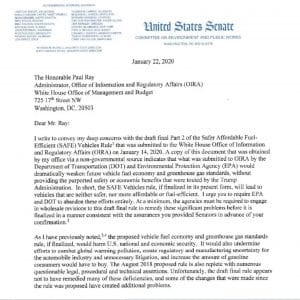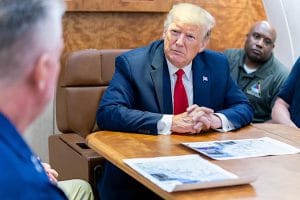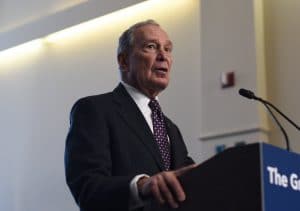The White House is reversing itself on federal fuel economy standards, a draft resolution now calling for mileage to rise 1.5% annually through 2029 after originally scheduled to freeze at 2020 levels.
The revisions come in the face of strong opposition from environmentalists and safety experts and with relatively little backing from the auto industry for an outright freeze. But the draft resolution that has surfaced is still taking hits from those who say it doesn’t go nearly far or fast enough. By comparison, the Corporate Average Fuel Economy, or CAFE, standards enacted by the Obama administration targeted a 5% annual mileage increase.
In a letter to the Office of Management and Budget, Senator Tom Carper, a Delaware Democrat, said he had “deep concerns” about the latest proposal. “My office’s review of the draft final rule indicates that it utterly fails to provide any demonstrable safety, environmental or economic benefit to consumers or the country,” he wrote.
(Toyota’s image hurt by support of Trump, poll claims)
The Trump administration has taken an aggressively anti-regulatory stance since the president was sworn into office in January 2017. Many of the White House moves have targeted the auto industry. Among other things, it last year announced it would strip California of the ability to set automotive carbon dioxide standards, something that effectively allows the state to set even tougher mileage guidelines than those in the Obama CAFE rules. In turn, that was expected to push automakers to begin shifting to battery-electric cars, even though sales have lagged expectations.

The opening part of a lengthy letter sent by Sen. Tom Carper to the Office of Management and Budget.
The move on the California waiver touched off a firestorm and has led to numerous legal actions, more than a dozen states that copy the California rules trying to block the administration’s move.
Whatever the White House finally approves in terms of a CAFE update also is expected to face a legal challenge.
The current mileage rules emerged from an unprecedented compromised between regulators, environmentalists and the auto industry at a time when fuel prices were soaring and Americans were shifting to smaller, more fuel-efficient vehicles. But as gas prices fell back and motorists by the millions turned to less efficient SUVs, the auto industry asked for a “midterm review” that could have led to a rollback. That was rejected during the final days of the Obama administration.
Almost immediately after taking office, President Donald Trump signaled he was more sympathetic to easing mileage guidelines. In 2018, the administration revealed the “Safer Affordable Fuel-Efficient Vehicles Rule,” a measure that would have frozen fuel economy numbers at 2020 levels.
Administration officials used several concerns to justify the plan. They estimated the Obama rules would add $2,500 to the cost of an average new vehicle. In turn, they warned that this would slow sales of newer, safer vehicles. They also claimed that higher mileage requirement would lead Americans to drive more, leading to 12,700 additional highway deaths through 2029.
The harsh reaction from environmentalists and safety experts was predictable, but the administration may not have counted on the relatively lukewarm response from the auto industry. Even companies that had wanted a midterm review indicated the freeze went too far. Other manufacturers indicated they didn’t expect to adjust their product plans no matter what the administration did.
(EPA, NHTSA submit final fuel economy proposals to Trump)
“We’re not changing our strategy” on fuel economy, Art St. Cyr, the head of automotive operations for American Honda, told TheDetroitBureau.com last September.
Among other things, industry officials said, they already had locked down plans through mid-decade, They also expected the likely legal challenges would stretch out for some time, leaving little but uncertainty about federal policy. And, were Trump to be denied re-election in November 2020, the expectation has been that a victorious Democrat would likely tighten mileage rules once again.
Michael Bloomberg, the former New York mayor running for the Democratic nomination is calling for the replacement of all gas and diesel-powered vehicles with EVs by 2035.
Both the EPA and NHTSA declined to officially comment on the latest draft proposal on fuel economy standards. But speaking on background, a NHTSA official told NBCNews that it stood by its earlier position, stating, “the final CAFE standards will result in more people being able to afford newer vehicles, which will lead to fewer road deaths as newer cars are safer.”
Carper, a ranking Democrat on the Senate Environment and Public Works Committee, questioned the administration’s math. Ultimately, he argued, motorists will save more on fuel than they’d have to spend to get higher-mileage vehicles. So, increasing CAFE could result in more lives saved as well as a cleaner environment.
(Bloomberg would push U.S. to go all EVs by 2035)
The planned rollback of CAFE has been delayed repeatedly. It remains unclear when a formal announcement of a final plan will be announced by the White House.


